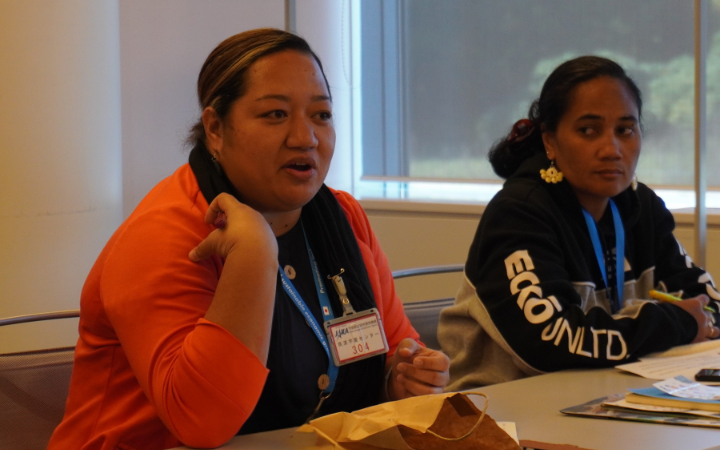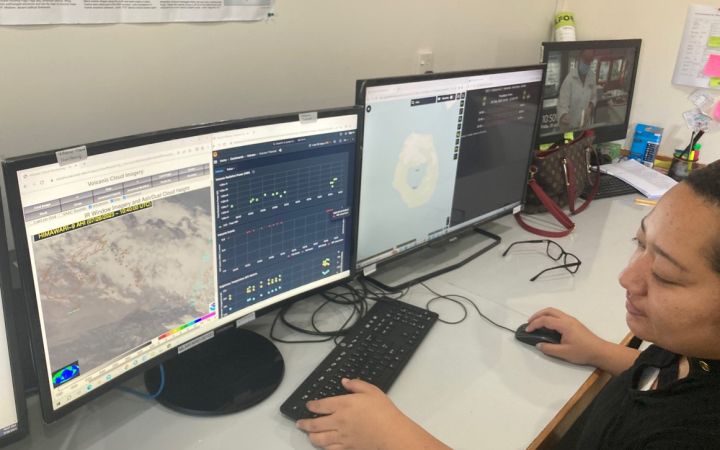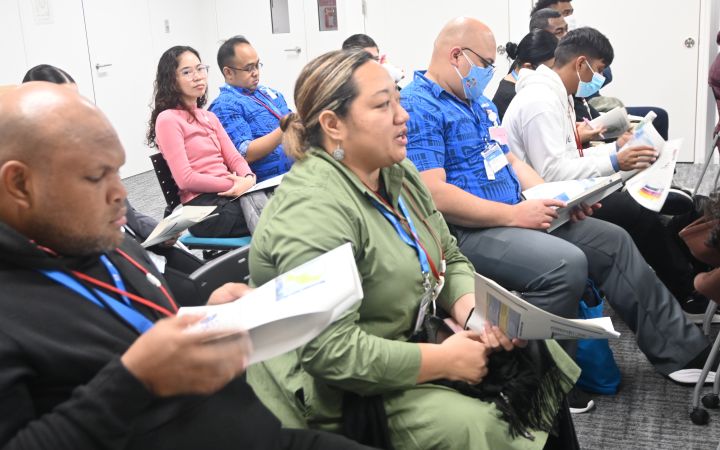- Savelinga Fatafehi ‘O Lapaha Fa’oliu, an assistant geologist with Tonga Geological Services, completed the UNITAR “Leave No One Behind: Rapid Response to Climate Crises through Early Warning Systems” training programme.
- The training, which included online phases and a study tour to Japan, helped Savelinga strengthen her skills to develop early warning systems to improve disaster preparedness.
- Savelinga learned the importance of integrating technology with community involvement. She aims to apply what she learned to build a more disaster-prepared and resilient community in Tonga.
26 March 2025 Hiroshima, Japan - Tonga’s rugged landscapes and deep blue Pacific waters have long been both a source of pride for the people of Tonga and a constant reminder of nature’s unpredictable power. For Savelinga Fatafehi ‘O Lapaha Fa’oliu, an assistant geologist at Tonga Geological Services, every day is a commitment to safeguarding her community against the island nation’s natural hazards.
Learning about Disaster Risk Reduction and Early Warning Systems with UNITAR
In her role, Savelinga is at the forefront of monitoring geological hazards. To help ensure that what she monitors translates into more effective disaster reduction, she joined the 2024 UNITAR “Leave No One Behind: Rapid Response to Climate Crises through Early Warning Systems” training programme. The programme, funded by the Government and People of Japan, aimed to equip individuals and communities in Pacific Island countries with the knowledge and skills to effectively disseminate, monitor, analyse and respond to early warning signals for climate hazards and extreme weather events.
Savelinga had been introduced to early warning systems in the previous UNITAR training she completed, the UNITAR “Women’s Leadership in Tsunami-based Disaster Risk Reduction” programme in 2022. The segment on early warning systems captured Savelinga’s attention as a geologist because of its emphasis on earthquakes and volcanic eruptions, both risks that Tonga faces. Joining the 2024 programme, with its in-depth focus, seemed like a logical next step.
Lessons from Japan: A glimpse into the future
The early warning system programme’s first phase was held online, and the top-performing participants were invited to a final 12-day study tour in Japan – Savelinga among them.
Visiting Japan was a transformative experience for Savelinga. Japan, renowned for its proactive disaster preparedness and advanced technological systems, offered her a glimpse into Tonga’s possible future. Through field visits to the Japan Aerospace Exploration Agency and other sites, Savelinga learned about remote sensing technologies and meticulously designed early warning systems.
The contrast between Japan’s sophisticated systems and Tonga’s current setup was stark, yet it sparked a hopeful determination within her.
Japan was really prepared for disasters and early warning systems ... We need to catch up, but I believe Tonga can get there in the future, Savelinga says.
The most important lesson she learned in Japan, however, was that early warning systems were not just about technology. Savelinga was impressed by how Japan also mobilized communities and issued warnings through mobile phones and radio to ensure that people could respond in a timely manner. She realized that while resources might be limited in Tonga, there was plenty of scope to strengthen disaster preparedness through better awareness, coordinated community action and communication.
A good early warning system is not just about technology, but also about community involvement and clear communication. — Savelinga Fatafehi ‘O Lapaha Fa’oliu, geologist and UNITAR training programme alumna, Tonga
From Knowledge to Action: Implementing change at home
Returning to Tonga with a renewed sense of purpose, Savelinga has been translating her newfound knowledge into tangible improvements for her community. In her daily work, she advocates for integrating advanced monitoring technologies with grass-roots community awareness and preparedness.
I want to help Tonga become better prepared, not only with technology but with strong community networks that can respond quickly and effectively. — Savelinga Fatafehi ‘O Lapaha Fa’oliu, geologist and UNITAR training programme alumna, Tonga
She is working on enhancing the existing earthquake and volcanic monitoring systems while collaborating with local leaders to develop training and community drills that empower residents to act decisively when alarms sound. Savelinga is particularly committed to ensuring that vulnerable groups are included.
I aim to … ensure that vulnerable groups are included in disaster planning and response. — Savelinga Fatafehi ‘O Lapaha Fa’oliu, geologist and UNITAR training programme alumna, Tonga
Savelinga’s vision is a Tonga where every community member is informed, equipped and connected through an integrated early warning system.
Building a Resilient Future Together
Through the UNITAR programme, Savelinga saw that resilience is built not only through state-of-the-art systems but also through the shared commitment of communities to support one another in times of crisis. In a nation where disasters remain an ever-present threat, every lesson learned, every new technology adopted, and every community member trained contributes to a safer, more resilient future.
She calls on fellow disaster risk management professionals to continue learning from each other and sharing best practices for safer, more resilient communities. While challenges may be daunting, she has faith that they can be overcome through mutual support and continual innovation.
By putting the lessons from UNITAR and Japan to use, Savelinga is laying the groundwork for a future where every Tongan can face disasters with confidence and resilience.
UN Volunteer Alameldin Talib contributed to this article.
About the “Leave No One Behind: Rapid Response to Climate Crises through Early Warning Systems” training programme
“Leave No One Behind: Rapid Response to Climate Crises through Early Warning Systems” training programme aims to equip individuals and communities in Pacific Island countries with the knowledge and skills to effectively disseminate, monitor, analyse and respond to early warning signals for climate hazards and extreme weather events. Ultimately, the programme will help save lives and reduce the negative social and economic impact of climate-related hazards.
The programme is part of the UNITAR Shimanami Collective initiative, which comprises a series of training programmes to build resilience against disasters and enhance sea and human security in the Asia-Pacific, with a special focus on empowering youth and women. Financially supported by the Government and the People of Japan, the Shimanami Collective initiative consists of specialized training in three areas: sea and human security, early warning systems, and women’s leadership in disaster risk reduction.
About UNITAR
The United Nations Institute for Training and Research (UNITAR) is a dedicated training arm of the United Nations. In 2023, UNITAR trained approximately 540,000 learners around the world to support their actions for a better future. UNITAR has a global presence, with offices in Geneva, Hiroshima, New York and Bonn and networks around the world. Find out more at www.unitar.org




